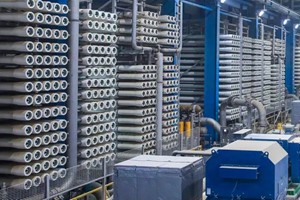Researchers from Oxford Brookes University, in partnership with experts from Türkiye, Sweden, and the U.K., have developed a groundbreaking technology to combat the environmental threat posed by toxic per- and poly-fluoroalkyl substances (PFAS), commonly known as “forever chemicals,” found in water supplies. The project, led by Professor Iakovos Tzanakis and Royal Society-Newton Fellow Morteza Ghorbani, focuses on creating a practical and scalable solution to effectively remove PFAS from water.
The Technology: Hydrodynamic Cavitation
The innovative hydrodynamic reactor employs a process called cavitation, where bubbles form and collapse due to pressure changes in fast-moving liquids within confined spaces. This method cleans water efficiently without the need for expensive chemical agents, making it both eco-friendly and energy-efficient. Initial tests at the Hammarby Sjostad wastewater treatment plant in Sweden demonstrated impressive results, achieving nearly a 36% degradation rate of 11 common PFAS variants within just 30 minutes.
“The results exceeded our expectations. We are now conducting in-depth studies to better understand and optimize the underlying mechanisms of PFAS removal,” remarked Ghorbani.
The Health Risks of PFAS
PFAS chemicals, first invented in the 1930s, have been widely used in products like nonstick cookware, waterproof clothing, and food packaging. However, since the 1970s, concerns regarding their toxicity have emerged, with links established to serious health conditions, including thyroid disorders, elevated cholesterol, liver damage, and cancer. These substances have been detected in water supplies globally, primarily entering through industrial wastewater, agricultural runoff, and household sewage.
Removing PFAS from water has proven challenging and costly, often limited to laboratory-scale treatments. The collaboration among the research teams aims to change this paradigm.
A Commitment to Sustainable Solutions
With a clear objective to scale up the reactor for larger volumes of PFAS-contaminated wastewater, the researchers are working towards treating up to 20 liters initially, with plans to extend this capacity to 200 liters in a treatment plant in Sweden. “Our aim is to refine and enhance this promising technology for widespread use in wastewater treatment facilities globally. By 2035, the EU mandates that all PFAS-containing waste must be treated, and we are determined to contribute to that effort,” stated Ghorbani.
International Efforts Against PFAS Pollution
This innovative project aligns with broader international initiatives to regulate and reduce PFAS levels in water supplies. In the U.K., the Royal Society of Chemists has launched a campaign to tackle the issue, while the EU plans to introduce stricter regulations on PFAS chemicals by 2024. The United States has also set legal limits to safeguard public health.
Türkiye’s Role in Environmental Innovation
The collaboration between Oxford Brookes University and Turkish partners, including Sabanci University and Beko, underscores a commitment to addressing global environmental challenges through international cooperation. Türkiye's expertise and resources have been vital to the success of this project, highlighting the nation's significant role in advancing sustainable technologies.
Professor Tzanakis emphasized the importance of this work, stating, “Our technology has the potential to revolutionize wastewater treatment, offering a safer, more sustainable approach that can be scaled globally. The advancements in green hydrodynamic cavitation overcome the limitations of traditional methods, making it a viable alternative for communities worldwide.”
As global efforts to combat PFAS pollution gain momentum, the innovative work led by Oxford Brookes University and its partners stands as a beacon of hope in the quest for cleaner, safer water around the world.
By Koray Erdogan













